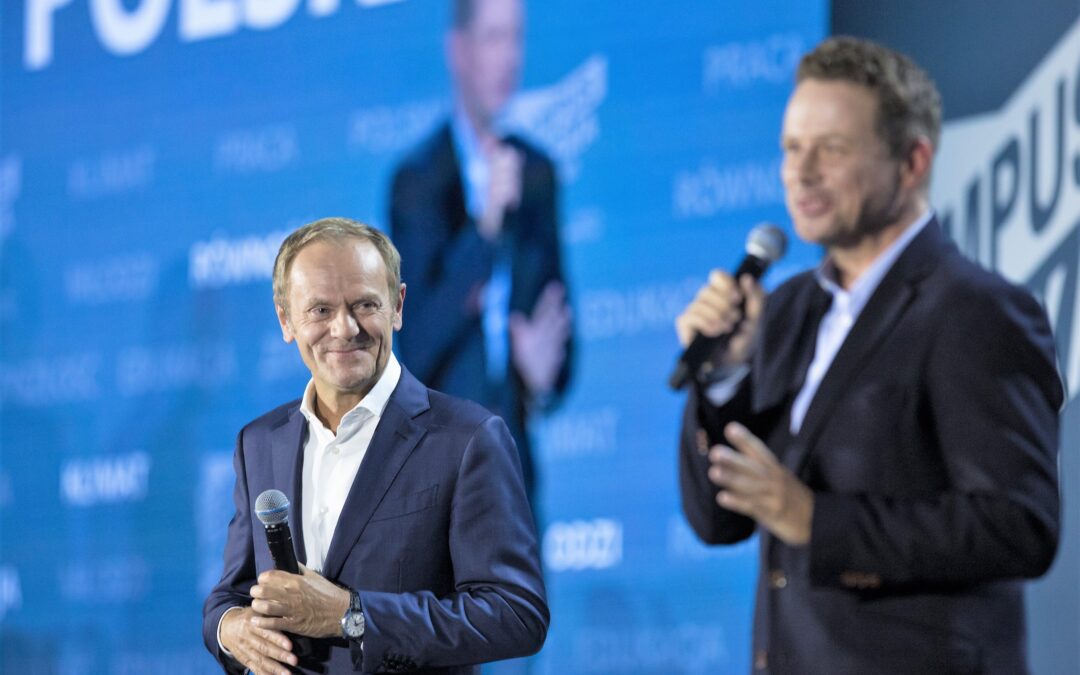Donald Tusk, the leader of Poland’s largest opposition party, has pledged to immediately introduce same-sex unions if he comes to power. The remarks came at an event seen as being designed to boost support for the centrist Civic Platform (PO) among young Poles.
“When will I be able to marry my boyfriend?” asked a young man participating in the town-hall-style “Campus Polska” event on Friday. Tusk replied that introducing civil partnerships would be “one of my first decisions” if he were to “lead the parliamentary majority after the [next] elections”.
Poland has for the last two years been ranked as the worst country in the European Union for LGBT people, amid a sustained campaign by the ruling national-conservative Law and Justice (PiS) party against what it calls “LGBT ideology”.
But even under the previous PO-led administration, which ruled Poland between 2007 and 2015 with Tusk as prime minister for most of that time, no legislation was introduced to expand LGBT rights. Since then, however, polls have shown increasing support for LGBT rights in Poland, especially among young people.
Some have expressed scepticism regarding Tusk’s latest promise, given his and his party’s previous record. “If this is to be credible, submit a draft [law] in parliament, so that everyone knows exactly what to expect,” wrote Anna-Maria Żukowska, an MP from The Left (Lewica), Poland’s second-largest opposition group.
One leading LGBT rights activist also criticised Tusk for not going far enough. “Today, when asked about LGBT weddings, Donald Tusk replied that he can only give partnerships,” wrote Bartosz Staszewski. “Poles expect full equality.”
Dzisiaj @donaldtusk pytany o śluby LGBT odpowiedział że może dać tylko związki partnerskie. To nie jarmark żeby się targować. Polki i Polacy oczekują pełnej równości a nie protezy. Chcemy równości, która Panu wystaje zza pleców. pic.twitter.com/KkL3n0K3hN
— Bart Staszewski 🏳️🌈🇵🇱 (@BartStaszewski) August 27, 2021
In his remarks, Tusk admitted that he is “more cautious” than some in his party “when it comes to these strong [but] necessary moral changes”. This, he explained, is because he knows that “for many Poles it is still something not easy to accept”, reports Wirtualna Polska.
Ahead of last year’s presidential elections, PiS-backed incumbent Andrzej Duda also indicated that he would be willing to sign a law introducing same-sex civil partnerships in Poland.
However, later in the campaign Duda launched a series of attacks on “evil LGBT ideology”, which he pledged to “ban in public institutions”. The president also promised to amend the constitution to ban adoption by same-sex couples, though since winning re-election he has done nothing to follow through on that pledge.
Tusk’s latest remarks came when speaking alongside Duda’s defeated presidential rival Rafał Trzaskowski, a deputy leader of PO who, as mayor of Warsaw, has supported LGBT rights, including becoming the city’s first leader to attend its annual LGBT equality parade.
The two appeared together on stage at Campus Polska Przyszłości, a gathering for around 1,000 participants aged between 18 and 35. The pair’s “debate” was the first time they had spoken in public jointly following Tusk’s return as leader of PO in July, amid rumours Trzaskowski had coveted the job himself.
Other speakers at the event included Belarusian democratic opposition leader Sviatlana Tsikhanouskaya and the mayors of other European cities, including Gergely Karácsony from Budapest, Remigijus Šimašius from Vilnius and Sadiq Khan from London.
Brilliant to join such a young and engaged group of future leaders at @Campus_Polska.
Thanks to Mayor of Warsaw @trzaskowski_ and Mayors of Gdansk @Dulkiewicz_A & Vilnius @RemiSimasius for a great debate and discussion. #CampusPolska pic.twitter.com/cd1iUGtEEO
— Sadiq Khan (@SadiqKhan) August 28, 2021
Main image credit: Adam Stepien / Agencja Gazeta

Maria Wilczek is deputy editor of Notes from Poland. She is a regular writer for The Times, The Economist and Al Jazeera English, and has also featured in Foreign Policy, Politico Europe, The Spectator and Gazeta Wyborcza.




















